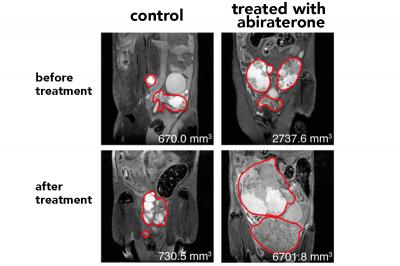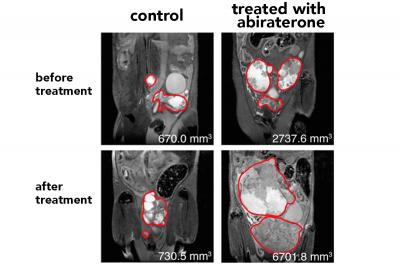
Credit: Cory Abate-Shen and Michael Shen / Columbia University Medical Center
New York, NY (May 4, 2017)–Columbia University Medical Center (CUMC) researchers have discovered a molecular mechanism that reprograms tumor cells in patients with advanced prostate cancer, reducing their response to anti-androgen therapy. The findings, based on a study in mice, could help to determine which patients should avoid anti-androgen therapy and identify new treatments for people with advanced prostate cancer.
The study was published online April14th in the journal Cancer Discovery.
Since androgens (male hormones) are known to drive prostate cancer, patients with recurrent or advanced disease are typically treated with anti-androgen medications. However, most patients fail treatment and develop an aggressive form of prostate cancer known as castration-resistant prostate cancer, or CRPC.
"It's been a mystery why some patients do not respond to anti-androgens, and why a subset of these patients actually get worse after treatment," said study co-leader Cory Abate-Shen, PhD, the Michael and Stella Chernow Professor of Urological Oncology and professor of urology, medicine, systems biology, and pathology and cell biology at CUMC. "Our findings show that in many of these patients, the tumor cells are reprogrammed so that they are no longer dependent on androgens."
To learn about the molecular mechanisms that drive resistance to anti-androgens, Drs. Abate-Shen and Michael Shen co-led a team to develop a strain of mice that lack two tumor-suppressor genes, Trp53 and Pten. These genes are both mutated in about 25 percent of patients with advanced prostate cancer. Mice that were treated with the anti-androgen drug abiraterone failed to respond and had accelerated tumor growth–similar to some humans with advanced prostate cancer who do not respond to anti-androgen therapy.
"We found a number of genes that were overexpressed in mice with CRPC and also conserved in patients with the disease. Among the most interesting of these was SOX11, which regulates the development of the nervous system," said study co-leader Michael M. Shen, PhD, professor of medical sciences at CUMC.
Most localized, slow-growing prostate cancers are largely composed of epithelial cells, which are rich in androgen receptors that increase their susceptibility to anti-androgen therapy. In contrast, aggressive prostate cancers, particularly those that fail treatment, often contain many neuroendocrine-like cells, which lack androgen receptors and are therefore less responsive to anti-androgen therapy.
"This raised the question, where are the neuroendocrine-like cells in prostate tumors coming from?" said Dr. Abate-Shen. "While previous research hinted that epithelial tumor cells may be reprogrammed to become neuroendocrine-like cells, our study provides the first direct evidence that this reprogramming is actually occurring and that it is mediated, at least in part, by SOX11."
The researchers also demonstrated that SOX11 acts in a similar fashion in human prostate cancer cells.
"By giving anti-androgens to patients with CRPC, we are eliminating the cancer cells that need androgen to survive and enriching the tumor with the remaining neuroendocrine-like cells. The net effect is to create an even more aggressive tumor," said Dr. Shen.
The researchers also identified several "master regulators"–genes that control SOX11 and other genes involved in prostate cancer reprogramming–that might be targeted for new prostate cancer treatments.
"Based on our findings, genetic testing to identify SOX11 and the master regulators may be considered before embarking on anti-androgen therapy for patients with advanced prostate cancer," said Dr. Shen.
###
The study is titled, "Transdifferentiation as a mechanism of treatment resistance in a mouse model of castration-resistant prostate cancer." The other contributors are: Min Zou (CUMC), Roxanne Toivanen (CUMC), Antonina Mitrofanova (CUMC and State University of New Jersey, Newark, NJ), Nicolas Floch (CUMC), Sheida Hayati (State University of New Jersey, Newark, NJ), Yanping Sun (CUMC), Clémentine Le Magnen (CUMC), Daniel Chester (CUMC), Elahe A. Mostaghel (Fred Hutchinson Cancer Research Center, Seattle, WA), Andrea Califano (CUMC), and Mark A. Rubin (Weill Cornell Medicine/NewYork-Presbyterian, New York, NY).
The study was supported by grants from the National Institutes of Health (P30 CA013696, UL1 TR00040, P01 CA173481, CA154293, DK076602, CA196662, U54 CA209997, R35 CA197745, UL1 TR001873), the Pacific Northwest Prostate Cancer SPORE (P50 CA097186), the DOD Prostate Cancer Research Program (PC150051, PC131821), the Prostate Cancer Foundation, the TJ Martell Foundation for Leukemia, Cancer and AIDS Research, the National Health and Medical Research Council of Australia, the Swiss National Science Foundation, and the FM Kirby Foundation.
The authors declare no financial or other conflicts of interest.
Columbia University Medical Center provides international leadership in basic, preclinical, and clinical research; medical and health sciences education; and patient care. The medical center trains future leaders and includes the dedicated work of many physicians, scientists, public health professionals, dentists, and nurses at the College of Physicians and Surgeons, the Mailman School of Public Health, the College of Dental Medicine, the School of Nursing, the biomedical departments of the Graduate School of Arts and Sciences, and allied research centers and institutions. Columbia University Medical Center is home to the largest medical research enterprise in New York City and State and one of the largest faculty medical practices in the Northeast. The campus that Columbia University Medical Center shares with its hospital partner, NewYork-Presbyterian, is now called the Columbia University Irving Medical Center. For more information, visit cumc.columbia.edu or columbiadoctors.org.
Media Contact
Karin Eskenazi
[email protected]
212-342-0508
@ColumbiaMed
http://www.cumc.columbia.edu
############
Story Source: Materials provided by Scienmag





